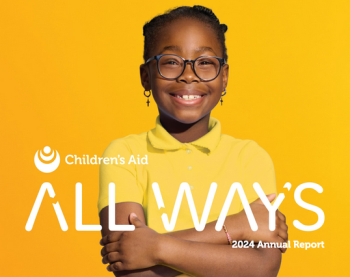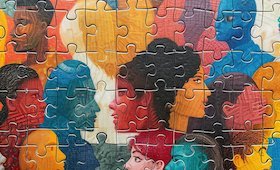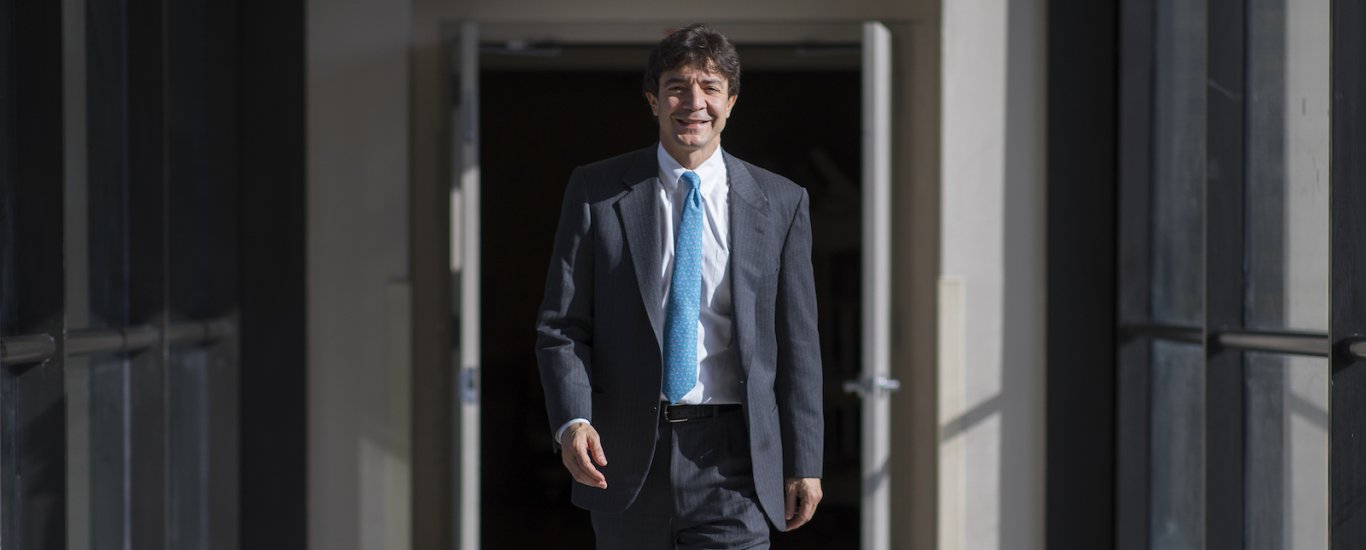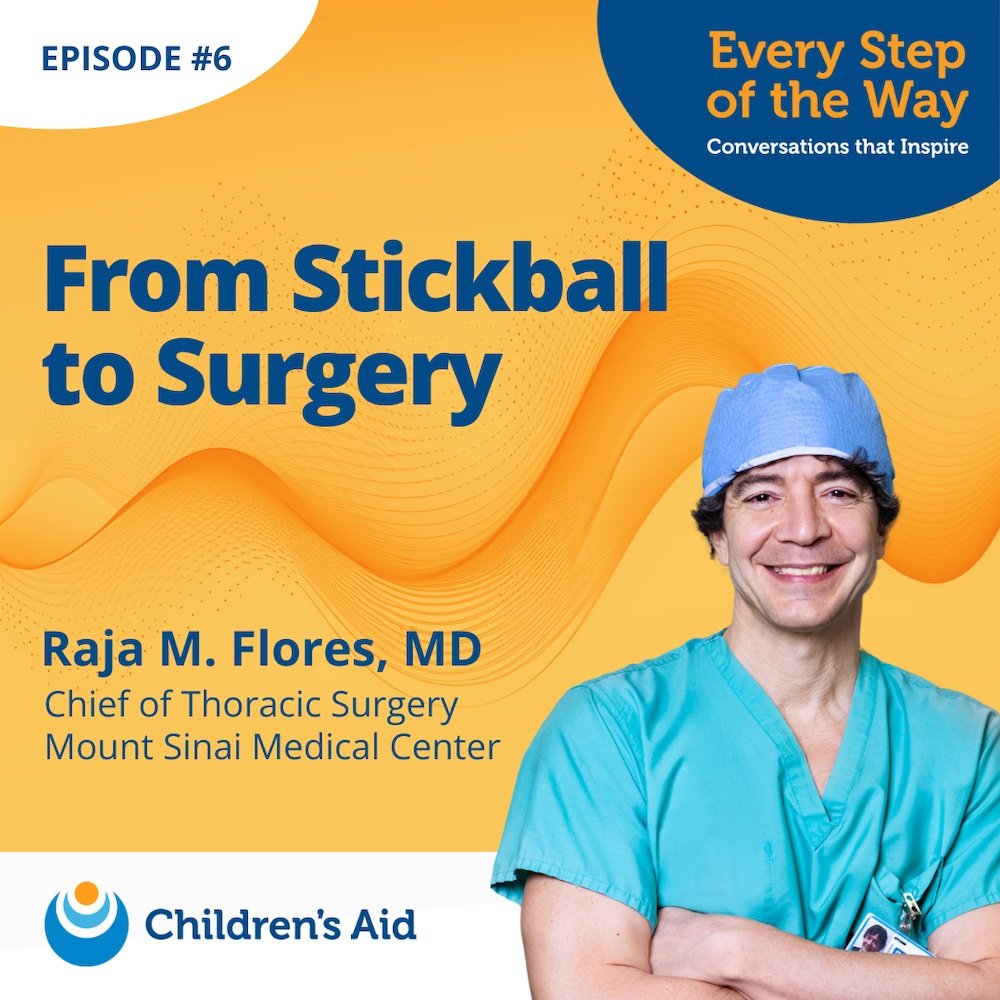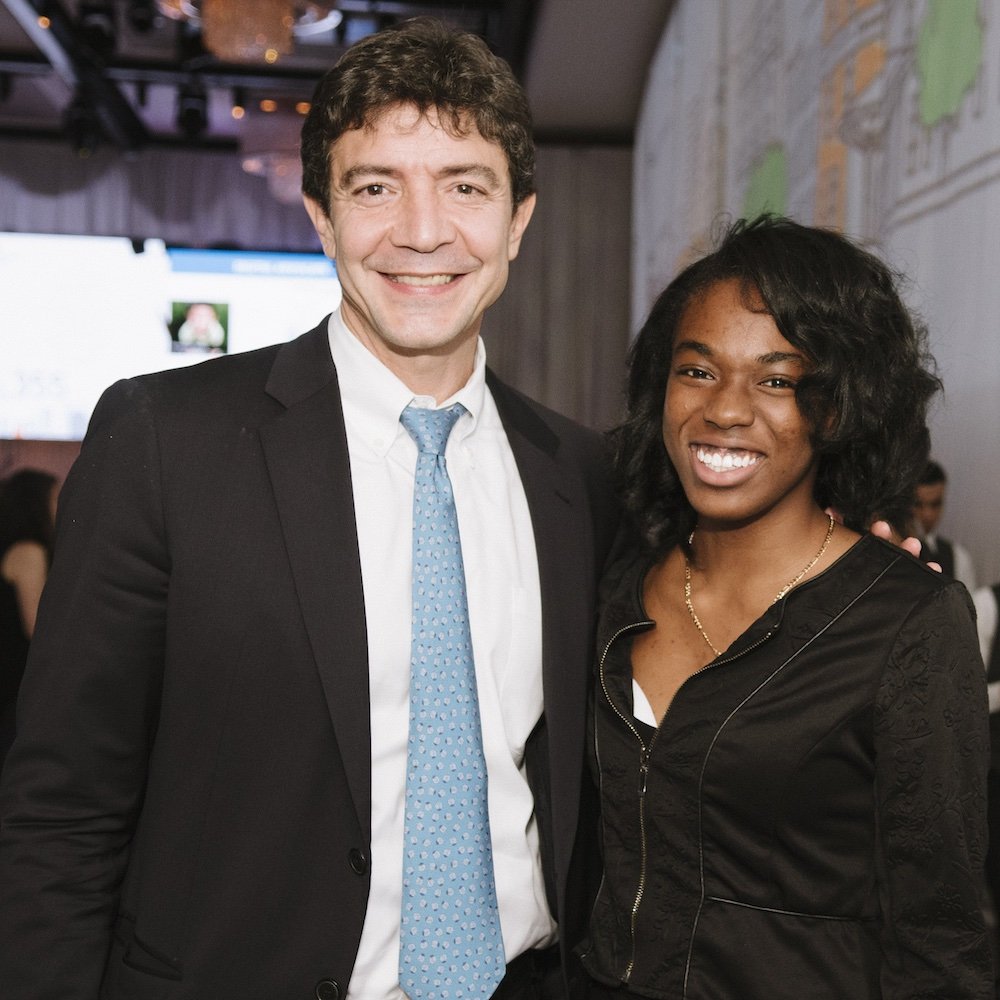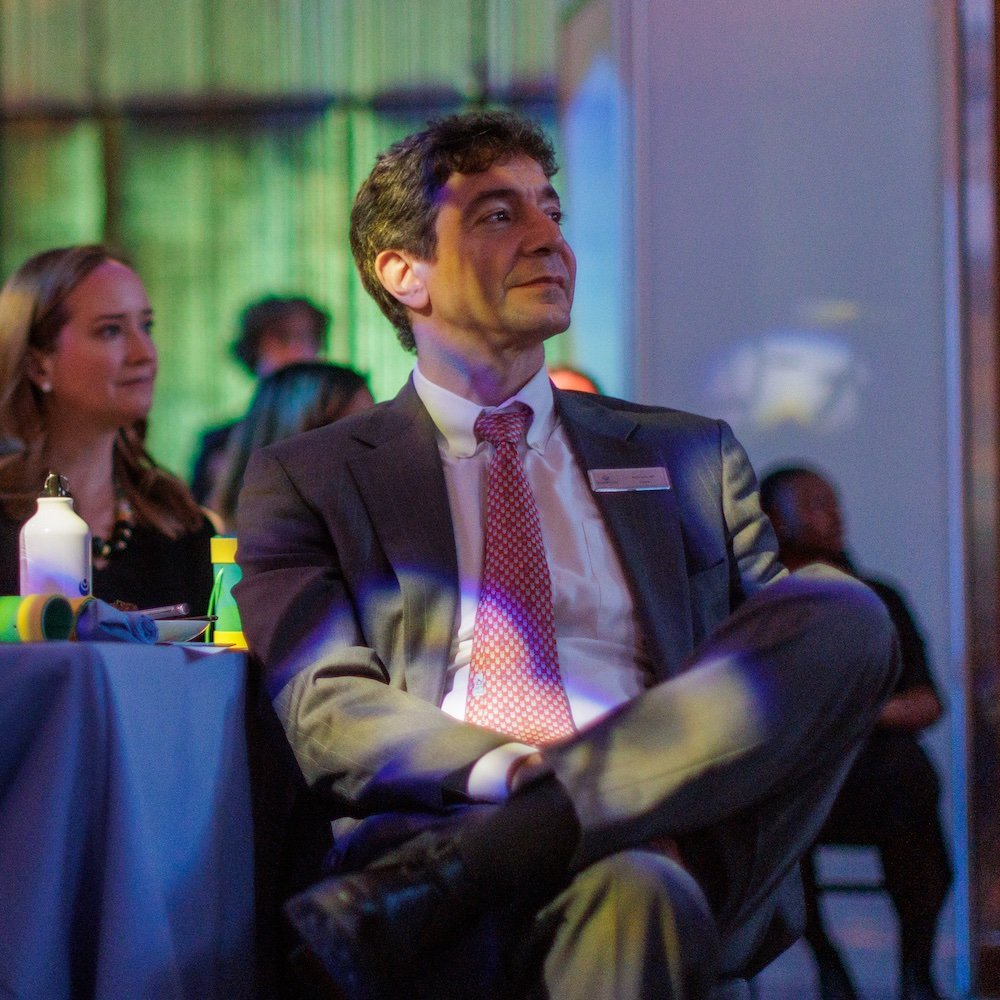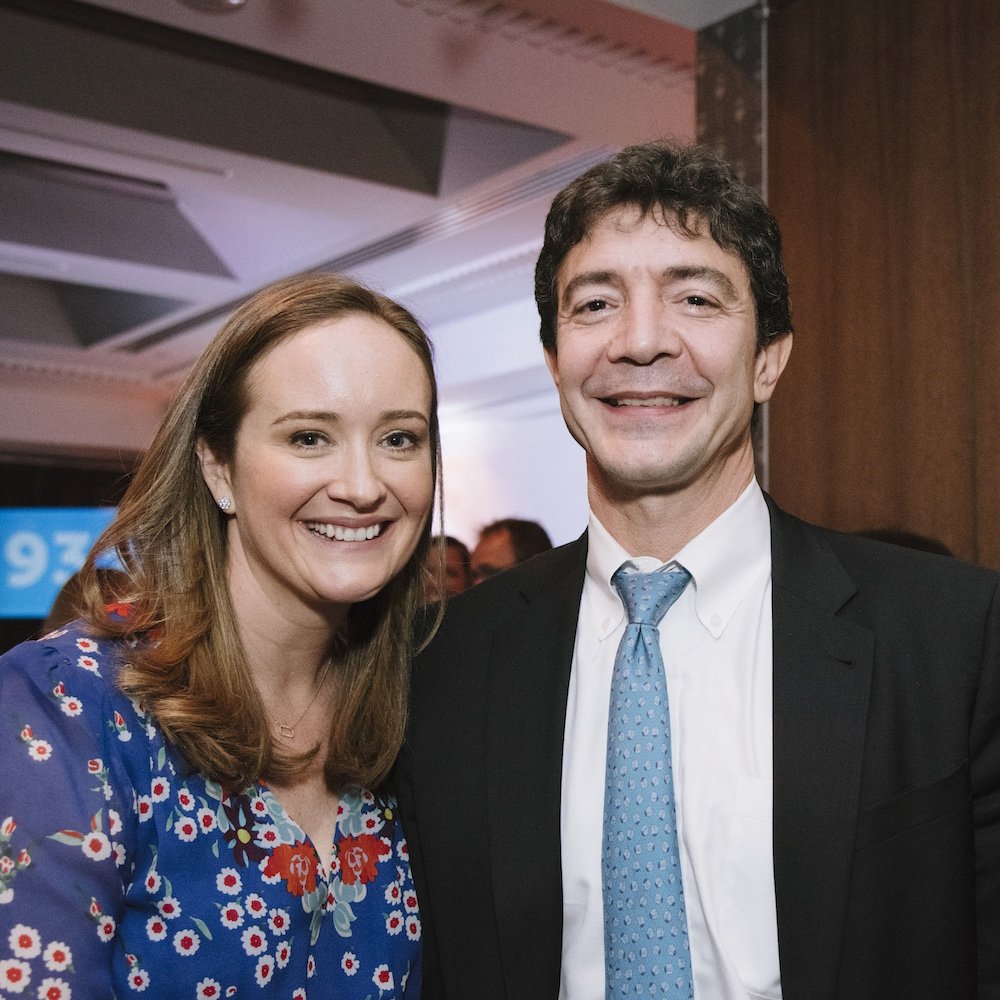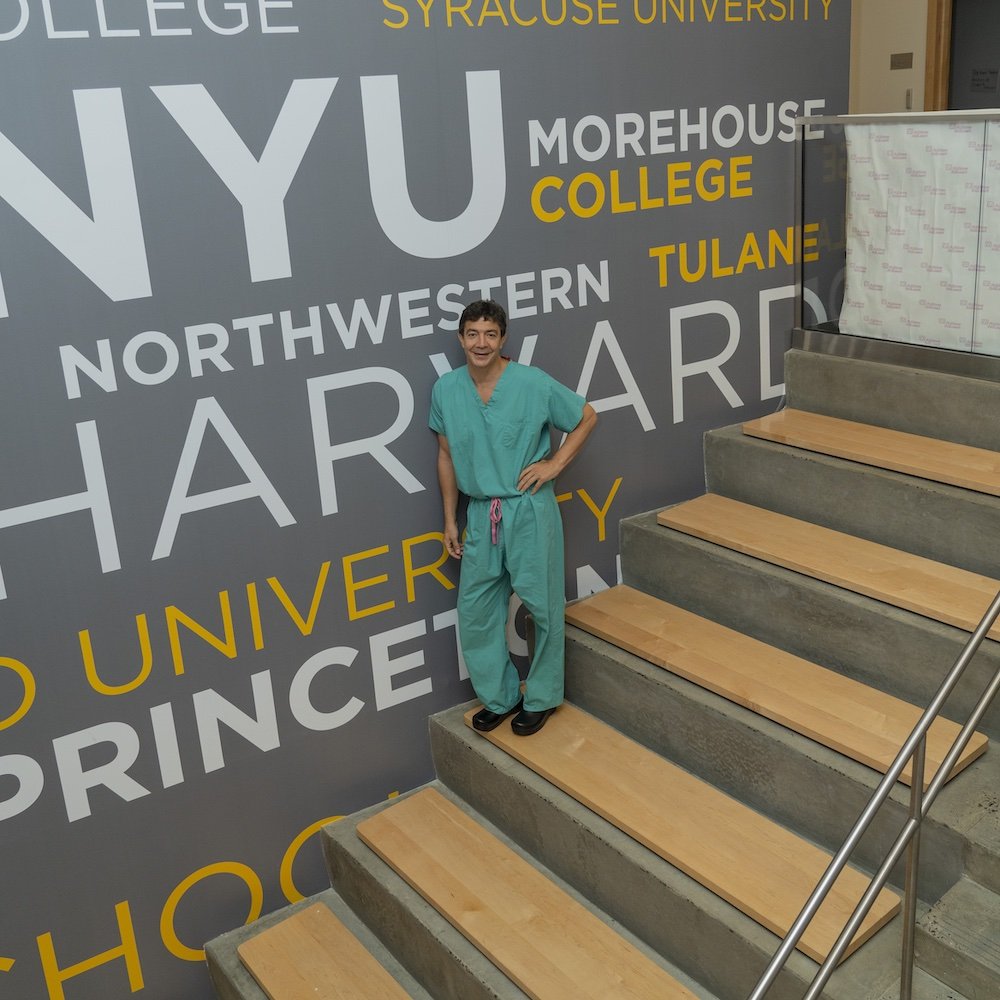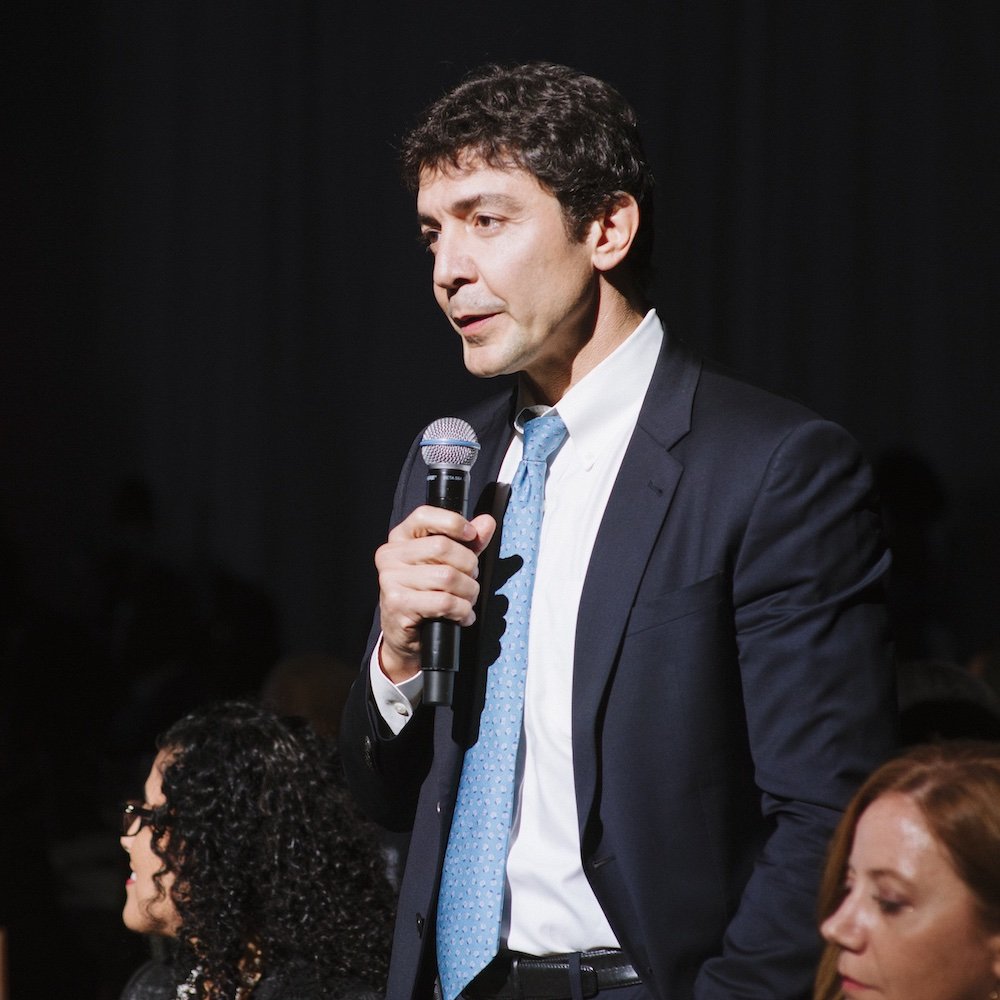Georgia Boothe: [00:00:00] Good day everybody, and welcome to another episode of Every Step of the Way. I have with me today Sandra Escamilla, my partner in this work. Hi Sandra. How are you today?
Sandra Escamilla: Hey, everybody. Nice to see you. Nice to be here with you today.
Georgia Boothe: Great. I am so excited about our next guest who is a board member at Children's Aid and also a former participant in our program.
Today, we get to talk to Dr. Raja Flores and I'm so excited to hear his story. So let's get going.
Dr Raja Flores: Hi. Thanks for having me.
Sandra Escamilla: It's nice to see you again. I had the pleasure of spending time with Raja last week at one of our board meetings.
We visited Milbank, but he quickly told me that he was actually a participant at our East Harlem Center, another one of our centers.
Raja, can you tell me a little bit about your background? So your family's from where?
Dr Raja Flores: So my father was born in Havana, Cuba. My mother was born [00:01:00] in Beirut, Lebanon. When I was six years old, my dad left. So I was raised just me and my mom, and that's when many people ask me, how come you sound Puerto Rican when you speak Spanish?
It's 'cause the neighborhood was Puerto Rican back then so I learned my Spanish on the street and not at home.
Sandra Escamilla: Love it. And so Raja comes from?
Dr Raja Flores: So Raja in Indian means king. I love that. But in Arabic, if you say it with and you write it with a certain thing, it means hope.
Sandra Escamilla: Oh, that's beautiful.
Georgia Boothe: Oh, that's beautiful.
Sandra Escamilla: And before we get into how you came to be part of the Children's Aid family, Raja, tell us a little bit about where you grew up and who you were before you came to Children's Aid.
Dr Raja Flores: So the way I got involved now as an adult was through the East Harlem Center, but as a kid I was downtown. It was called Lower West Side Center and now it is since closed. But that's how I got my start on Children's Aid when it was called the Children's Aid Society back in the late seventies.
Sandra Escamilla: Yes. Thank you [00:02:00] for clarifying that. You did say that, and before you came to Children's Aid, tell us about your background a little bit. You grew up in the Lower East Side?
Dr Raja Flores: Well, I grew up in Manhattan in what is now called the Meat Packing District. So, 14th Street, between ninth and 10th avenue. The most gentrified block in United States of America was our stickball field. So back then, picture 1979. You got about 15 dirty kids running around, you know, stickball, garbage on fire with sort of, the homeless guys there. There were prostitutes down the corner of the block, drug dealers on the other corner.
So, it was something out of a movie when I look back and now you go down that block – Armani stores. It's just, it's at another level. Actually, I grew up in the same neighborhood as the Wayans brothers, the comedians so they grew up in that area and now it's just a completely different area. You wouldn't recognize it.
Sandra Escamilla: Thank you [00:03:00] for that context. Now tell me a little bit, so you were playing stickball on 14th street, and how did you make your way over to Children's Aid?
Dr Raja Flores: So you had these teams in the neighborhood where you had various coaches who would coach baseball, basketball. And so I was on this basketball team with the coach was Mike Williamson, who grew up in the Fulton Projects down there on ninth avenue.
And we would go, and we didn't know this back then, but we would go play in the Children's Aid Society, which was downtown. It was called Lower West Side Center. And so every weekend during the wintertime, they had basketball games where we would go and play and then when you didn't have the basketball games, there was foosball and you know, all these other games that you would play there.
And it was basically a way to keep the kids off the street, and it was something that you just remember as a kid, you just got shuttled there. It's not like we [00:04:00] saw oh, Children's Aid and deliberately said, I wanna be part of this program. No, we're going wherever the wind blows. You got all the kids from the neighborhood going over there and so, you know, we went there and we played ball.
It was a safe place to be. So you weren't on the street.
Sandra Escamilla: Important question, did you win?
Dr Raja Flores: We did win the championship one year. One year we lost the championship, and the other years we didn't make it.
Georgia Boothe: I think it's so important you're demonstrating Raja, the importance of having available activities you know, just having a space for kids to go in the neighborhood and how, you know, that was critical for you. So once you became involved in Children's Aid, you know, what activities did you do and how did that kind of have an impact on your educational trajectory?
Dr Raja Flores: So with the Children's Aid, it was mainly sports. It was mainly physical. You are there, you're doing sports, you're running around, you were with good [00:05:00] role models, who would talk to you about what it's like to be a man, what makes a man. And it was very different than what you were exposed on the street.
But the other thing that the Children's Aid really helped me with was back then my teeth went all over the place. And so somehow my mom figured out that Children's Aid was gonna help with braces. So she took me down there one day and I remember there was a line around the block, and I saw a lot of the kids that I used to play ball with and like, yo, what's up?
You know? And then I remember going in there and they evaluated my teeth, and they were like, oh my God, this guy needs braces. You know, we couldn't afford braces, we barely could afford the rent. And so we went to, they shuttled us to NYU School of Dentistry, and we had people who were in training to be orthodontists evaluate our teeth.
And [00:06:00] then they, and then they put braces on for free. And you know, I had those braces for like five years and you had these residents working on you and that was all facilitated by Children's Aid. You know, we didn't pay a dime.
Sandra Escamilla: We had another participant share the same story about how she was able to get, her name was Frances. She was able to get braces through Children's Aid, and she talked about how that was life changing for her. And it sounds it was the same for you as well.
Dr Raja Flores: Oh yeah. I was very self-conscious to the point where I didn't smile.
People thought I was pissed off all the time. And also I was, you know, I wasn't always happy as a kid. And so it just added to it. And then once my braces came off, I was like a new man. You know, I, it was it really helped with my confidence and I didn't put my head down anymore when I laughed.
I didn't hide my smile. And so it was a big deal. But the thing to understand is back [00:07:00] then these programs, you didn't. You just kind of ended up there, like you didn't realize, oh, this is Children's Aid, I'm gonna do this, I'm gonna be in this program, I'm gonna be in this program. No, you just, you know, your parents are immigrants.
They don't know much. You just go with the flow. Everyone in the neighborhood's going there, you just end up there and one thing leads to another, and God willing things went in the right direction. I think nowadays we need to be more deliberate about identifying the kids who would benefit from stuff like that.
Because I grew up with a lot of kids that fell through the cracks. You know, as a medical student, I worked at Rikers Island. I saw a kid I grew up with while I was there, you know, so, they can easily go in the wrong direction and we've got to understand that and really make sure that they are brought into Children's Aid in a safe environment where they don't have to prove themselves, where they can just play sports, learn life lessons without worrying about [00:08:00] some of the difficult things that can wait for you out on the street.
Sandra Escamilla: It wasn't like you enrolled in the program, you were voting with your feet, right? You kept coming back 'cause obviously we were doing something that was working for you.
And I'm curious, Raja, when you look back and you know, hindsight is 20/20, was there an experience at Children's Aid? You talked about kind of the sports, you talked about, you know, kind of what with your teeth that you got support fixing your teeth. Was there a moment where something clicked for you that helped to pave the way to you becoming a doctor?
Dr Raja Flores: Even that was not deliberate. It was more like one thing led to another. It was easier to study and do well in school than to deal drugs. And it was, it was, I don't know if it was luck or God, knowing that my mom loved me, I don't know. It was a bunch of everything. You know, they gotta have at home someone that loves them.
Sandra Escamilla: so, Raja, I hear the ways in which Children's Aid was able to get [00:09:00] you off the streets to use your word, and also to help you with braces or with your teeth, that would then lead you to have more confidence. Is there anything in your experience when you're looking back, you know, hindsight is 20/20, that you can say, this was a clear path and this is what paved the way for me to become a doctor.
Is it that clear for you?
Dr Raja Flores: No, it's sort of blurry. The thing that stands out the most if I think back, it was really the male role models that were there. So when you're playing ball, you think you're just playing basketball, but you're looking up to that guy that's bigger than you that can dunk and you're saying, you know, and you're talking to them and they can either talk to you about , “listen little bro, you should stay in school. You know, you should study. That's going to serve you better than the guy dealing drugs on the corner.” And you need to have frank conversations I mean, the drug thing comes into play in the sixth grade, sometimes even earlier, you, you [00:10:00] gotta talk to them about that and they gotta realize there are alternatives to that. You do with what is immediately around you, what you're familiar with and you don't want that to be what they're familiar with. You want them to be familiar with the guy that worked hard, that is good at basketball, but that's not all he's about. He studies, he works when he can, you want that work ethic that, you know, it's not like, all right, I'm gonna go in this program, I'm gonna study in this program, so I do well in school. This or that. No, with especially with young boys, they've gotta feel like you get them. They gotta look up to you for other reasons, whether you're good at sports or whether you got a lot of muscles.
That's the stuff boys look up to. And then you work in the other stuff and it doesn't mean you're not gonna fall into some pitfalls, which I definitely did. But it helps you climb out of them when you know the difference between right and wrong.
Sandra Escamilla: Thank you for [00:11:00] sharing that. I love that.
Georgia Boothe: Yes. Raja, that's really amazing. And I think for some of our staff who will listen to this, you know, that's such an incredible message to to share with them the importance of them just being there for our young people
Dr Raja Flores: Interesting, at our site visit at Milbank I basketball coach and I realized how important that guy is. My son actually played on a different team but played against the Milbank kids. And right from the beginning this coach had them full court press. And I remember it like, like yesterday.
I'm like, what are they doing? And he's making them work hard and you can tell he was instilling in them a certain work ethic about working hard, but also made the other team step up their game.
And so, you realize through sports there's a lot you can teach by action [00:12:00] without saying it. And that's more important than telling someone, study, do this, do that. You show them what a strong work ethic is through your example and through the way you coach and I don't know if he realized that I was thanking him and appreciating him for the way he coached that team 'cause my son took something away from that.
Georgia Boothe: That's beautiful. Thank you for sharing that. So, Raja. Given your experiences at Children's Aid and being a student at the time, how did those experiences kind of help your experience in school, your activities in school as a student?
Dr Raja Flores: So, work ethic, you know, when you have your coaches, your tutors when they have made you see that working hard results in something like delayed gratification.
You work hard on your jump shot. Eventually, you know, you're making your jump shot. You lift weights for your legs. [00:13:00] Next thing you know, you're dunking the basketball. They taught you that if there's something down the line, you see that you work hard, and you'll get there. Children's Aid also helps you navigate and get into other programs that can help you.
So, as I was coming up, yeah, Children's Aid was a big part, but there was other things there was the Boys Club, there was something called Higher Achievement Program, HAP, there was another thing called Higher Education Opportunity Program, heop. There were programs left and right that helped kids like me that didn't have a lot of direction, but kept sort of knocking you on the right path, right?
Because you got all these other things trying to take you off your path. You've got acceptance with your peers, some of your peers. are going down the drug lane. Some of your peers are, you know, sort of doing other things, ripping off people and stealing and this and that. And, you kind of put a toe [00:14:00] here, you put a toe there, and you can easily go from this lane into the wrong path and I don't know if there's a lot of luck in there, but without love and caring from people who are in programs like Children's Aid, you don't have a shot. And yeah, there are some people who come through who end up in the wrong path, but without that, they've got no hope of going down the right path. The way I see what's happening in Children's Aid now, how structured it is with the focus and the knowledge that they have from the sort of societal levels.
I, I do think that it is a much better program now today than it was when I was coming up. It's more structured. It's more deliberate and I think it's focusing in on the right things. When I was younger it had a great intention, but I didn't really feel I was in a structured environment [00:15:00] not like what I saw at Milbank and what I saw when the East Harlem program was running.
Sandra Escamilla: What I love is that you made your way back to us, Raja, that you came back to us and now you are supporting our work as a board member. And I wanna hear a little bit about just your life now. What are you doing now? And tell us why you made your way back to us.
Dr Raja Flores: So now I've been a surgeon in this city for over 30 years.
I'm at Mount Sinai in Spanish Harlem, East Harlem. And so, I've been taking care of people from my hometown for my entire life.
And what's interesting is that the way I reconnected with the East Harlem Children's Aid was there was a flyer going around one time about it closing. And, uh I went to that meeting, and it made me connect again, and I saw there was a little bit of a disconnect between the Children's Aid people trying to do the right thing for Children's Aid [00:16:00] and the community.
They both wanted the same thing, but they couldn't speak the same language. And I'm not talking about Spanish or English. And it was just very interesting and I saw it and I saw how injured the community felt, and I also saw how helpless and hurt the people who were trying to do the right thing felt at Children's Aid.
And that made me start going again. And I started being involved in some of the programs there. And I saw the people in charge, how they would handle the students. And I realized, wow, this is a very valuable thing for the community. And somehow then I realized what a big deal Children's Aid was for me. There was a lot of, like I said, a lot of programs involved, but Children's Aid hit me at a very young age.
So, it changed the way I looked physically [00:17:00] with my teeth and everything. I had some big ass buck teeth and I appreciated it more as I got older and, and somehow God took me back there and I said, you know what? If I can help this place just a little bit of the way it helped me, then that's what I have to do.
It was again, just God guiding you. I don't know. And I'm so happy that I've reconnected.
Sandra Escamilla: Raja, we were really lucky to have you 'cause if I remember, you were a truth teller and you were able to help us see some of our blind spots. You know, that was a really hard time for us at Children's Aid. We were both trying to contend with meeting the needs of the community and also with some of the things that we were understanding about that space and its long-term sustainability.
So I've gotta tell you that on behalf of Children's Aid, I'm so grateful that you stood in that gap and spoke truth to us because then it allowed us to position ourselves better with our community. So, we constantly rely on folks like you, Raja, and folks in the [00:18:00] community to help us be better.
So thank you for helping us be better in that time.
So I appreciate that, first and foremost for you kind of standing in that gap and telling us the truth. And then secondly, I just keep hearing you talk about how valuable and how you wanna give back to Children's Aid, which I think again, we're so lucky that you made your way back to us.
And I'm curious what would you say to potential supporters of Children's Aid about how they could give back or even, you know, staff that, that's at Children's Aid. What advice would you give both supporters and staff at Children's Aid about giving back?
Dr Raja Flores: It's your time, your time is valuable.
The amount of time you spend there with the kids, they see it's like a kid and a parent. Kids know when their parents love them, you know, they see the effort, they see the sort of the emotional ups and downs that parents go through with their kids. And it's the same thing at Children's Aid, when you have a Children's Aid member or tutor or someone there who's in tune with the kid that kid [00:19:00] knows it, and the kid feels loved. Like half of my self-worth came from tutors and from people who, whether they did or not, said they believed in me. By hearing them say they believed in me, I started believing in myself more.
Before that there were some voices that were telling me the opposite.
I ended up down, you know, chasing a different path. So, it's not like I had this straight line of, oh, I'm gonna study, I'm gonna work hard, I'm gonna become a doctor. No. All right. I, here are the drugs.
Oh, here's the bad stuff. All right, I'm doing this. I, alright. I'm ending up going this way. It's just, it's not a straight path.
As a Children's Aid employee, worker, tutor, you gotta have faith in the kids. You just gotta keep giving them that love, like a mother's love.
The son could do all kinds of things. And that mom still loves that kid, is still doing everything for that kid. [00:20:00] And that's the way I see Children's Aid, you know, the doors are open and kids come in there all the time and you know, there's gonna be difficult moments, but you keep showing up and you keep wanting the best for society, for the community, and for the kids there.
And I do believe that it will pay off down the line where you will see these kids do incredible things.
Sandra Escamilla: Like be a thoracic surgeon.
Dr Raja Flores: I think, you know, I've seen these kids now as I'm older and as I'm a parent and they have unlimited potential.
And you just gotta open your eyes and you'll see it. What I think Children's Aid needs to do is let the world see their talent, because Children's Aid sees the talent.
Georgia Boothe: It's beautiful. Thank you for what you do as a board member and for you know, coming back to Children's Aid and wanting to give back. I'm curious though, Raja, you could have been a surgeon anywhere, but you chose to come [00:21:00] back to stay in New York City and to serve your community. And I'm curious, was that an intentional decision for you to wanna be in New York City and serving the East Harlem community?
Dr Raja Flores: Yeah, that was very intentional. Before I started here, I was at Sloan Kettering for 10 years. And it was a different demographic that I was seeing, that I was taking care of. And this job came up a couple of times where it wasn't the right time, wasn't this or that. Eventually I said I've gotta take care of that demographic.
So, Mount Sinai's located right in between the richest of the rich and the Upper East side and the poorest of the poor in Spanish Harlem. And you know, I just felt like I understand this community. I have to be in this community. And so, it's been very rewarding 'cause I did feel guilt when I was working at Sloan Kettering.
Even though I'm taking care of people, human beings are human beings. I felt like any [00:22:00] doctor in my position could take care of the community that I was taking care of at Sloan Kettering, but only I could understand the East Harlem, the Spanish Harlem community, and I should be there. You know, not to say that everyone needs to do that, but that's what I felt.
And so, when I'm there and I've got a little viejita not coming in, and I give her a little hug, I know where she's coming from. And I understand them sort of scared about seeing the doctor or about why they were eating Vicks. You know, there, there's something there that I get and I felt like a part of me was missing if I didn't give back because
I've been given so much. I've had so many opportunities that I think you can only get in America, and it was from all the programs that were put in place for kids like me. So I've gotta, I've gotta go back in there and not only help that community medically, surgically. [00:23:00] But that's why I reengaged with Children's Aid through the East Harlem program because I felt like I understand that part too.
I was a kid running around there throwing the basketball around and you know, I just remember being this little clueless kid. And so I, I know where they're coming from.
Sandra Escamilla: And so I wanna just honor all other aspects of you. I mean, you've talked about God as a through line, so you had an amazing faith. It sounds that helped to guide you as well. I know Children's Aid, we played a small part, but you had some resiliency that was built into you. And so, I wanna acknowledge that 'cause it's important.
Dr Raja Flores: I think there was a lot of luck, I was in many situations where I could have been a statistic and it was luck. And what I wanna make sure is that we don't leave our kids to luck.
Make them avoid that corner where their life could have been very different.
That situation where they could have ended up being a statistic. Because when I look [00:24:00] at my own life, it was dumb luck. Now, without the love and, the support from Children's Aid and the people that work there and other programs that I was involved as well, there's no way you make it.
Sandra Escamilla: Yeah.
Dr Raja Flores: Outta there. But I'd like to see it be less reliant on luck and more on a deliberate path that we can put these kids on.
Georgia Boothe: Raja, what would you say to our young people at Milbank in the East Harlem community and in our centers in the Bronx and in our school programs that are gonna listen to your story and maybe doubt whether or not they're capable of achieving what you've achieved, what advice would you give to them? What words of wisdom do you have for them?
Dr Raja Flores: So to speak to the young men, because I feel it was really young men that made me see the light is, you gotta lose this whole being bad, “yo, I'm a bad [00:25:00] dude.”
There was this growing up, you had to be tough. You have to do this. And I remember one time I was in an argument with my mom about someone who, she was trying to tell me, you should be like this person. And I said, yeah, but he doesn’t know the street. And my mom said, the street's stupid. You don't need, you know, you'll die out there.
Like she just made it sound like knowing the street is not gonna help you. It doesn't do anything. And she was right. And so if anything, I'd like to tell the young men out there, you don't have to be bad, you don't have to be tough. Study, do the right thing. Life's hard enough as it is. If someone is trying to take you down that wrong path, they don't care about you.
Even if it's your boy that you grew up with all your life, you were together since you were six, and he's going down that path, it's up to you to try and keep him from going down that path, not go down that path with him. And if he can't [00:26:00] understand that you don't wanna go down that path and you gotta distance yourself from that, and it's hard because you know because we all grew up together and we all go in different directions and you know and I love the guys I grew up with, but not all of them ended up doing okay. And I think it's very important that as an organization, you gotta understand what these young men are dealing with. And then from the girl standpoint, I've got two daughters. I got a son too, but I got two daughters. I think girls need a lot of just like the boys, you need love, you need encouragement.
But they also, they need to feel like they're in a safe space where they can study. It's just girls can fall into those traps too. Maybe it's not as dramatic as the boys, but teen pregnancies and also drugs and weed and stuff like that.
I would probably be a better [00:27:00] tutor for boys than I would for girls. But I do think that it provides a safe space for the girls to flourish and not feel like their whole identity is their sexuality and that their identity, they've got brains, they've got intelligence, they've got good judgment.
And I'll tell you some of the most impressive kids that I've seen coming up have been the women.
We need more men coming up, but the women are dominating in everything that I see. In med school, majority are women, in surgery residency now, women. So something's going right with them. I'd like to see us bring more men up.
Sandra Escamilla: I hear you, particularly more men of color.
Dr Raja Flores: Yes.
Sandra Escamilla: Yeah. I mean, the work you do is hard, right? You talked a little bit about your, I mean, you're a surgeon. You're a thoracic surgeon. How many surgeries did you perform today?
Dr Raja Flores: So, I just finished two. I got another one that I have to do. It's not hard. It's actually fun.
You know, like let's say if you're a Children's Aid kid and you're playing basketball, [00:28:00] that's how you feel when operating. Now when the patient is awake, that's a different thing. You gotta be compassionate and you gotta show caring. And you're not just dealing with the patient, you're dealing with the family.
You're treating the mother, the brother, the father, the sister. You're treating an entire family. And that's where your interpersonal skills and your compassion needs to show. But the surgery part? If you're good at basketball, you'll be a great surgeon.
Sandra Escamilla: That's great. And it has to start with you in terms of you taking care of yourself. Right? Talk a little bit about what you do for self-care.
Dr Raja Flores: So number one, don't do drugs. Number two, exercise. It's like in legally blonde, people who exercise have endorphins.
Exercise I think is a very important part. Not just physically, but mentally.
Go run around, lift some weights, play some basketball, and then you'll sit down and you'll be able to study. Realizing that studying is hard. Yeah. You know, it's [00:29:00] easier for me to operate than to study. Now to be able to operate and do it well, you gotta study a hell of a lot. So there is, everything's connected but I do think that it starts when they're younger, when they're going to Children's Aid, when they're, participating in sports or in the afterschool activities, learning things. But the most important thing are those people who work there, who care, and that the kids feel that they care.
Georgia Boothe: Well, thank you so much Raja for sharing your story with us today. I'm so happy and pleased that we had this opportunity to get to learn about you in this way. I'm so incredibly impressed and I'm so blessed that you are a member of the board here at Children's Aid and that you are serving the East Harlem community you know, thank you for coming home and being there for the members of the community. I think that's so awesome.
Sandra Escamilla: Yeah. Before you leave though, we [00:30:00] have lighting round questions, which means I'm gonna ask you a series of questions. It's whatever comes to mind, so don't overthink it.
So, what's your favorite color?
Dr Raja Flores: Blue
Sandra Escamilla: What is your least favorite color?
Dr Raja Flores: Brown
Sandra Escamilla: What inspires you most?
Dr Raja Flores: People
Sandra Escamilla: What discourages you the most?
Dr Raja Flores: People
Sandra Escamilla: What is a mantra or quote you live by?
Dr Raja Flores: That which does not kill you, makes you stronger
Sandra Escamilla: What sounds or noise brings you peace?
Dr Raja Flores: The beach
Sandra Escamilla: What sounds or noise do you find unsettling?
Dr Raja Flores: Construction
Sandra Escamilla: What career or role would you have loved to pursue if you had not been a doctor?
Dr Raja Flores: MBA
Sandra Escamilla: What job or role do you think would not suit you at all?
Dr Raja Flores: if I needed to make a living, I'd do anything.
Sandra Escamilla: Yes.
And if there's one thing that you could say to Raja, to old Raja, the young man who was on 14th street playing stickball, what would you say to him?
Dr Raja Flores: It's possible.
Sandra Escamilla: Thank you so much. We appreciate you.
Georgia Boothe: Thank you so much Raja.[00:31:00]
Dr Raja Flores: Thank you, guys.
